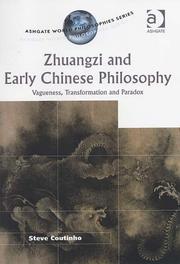| Listing 1 - 3 of 3 |
Sort by
|

ISBN: 0754637301 9780754637301 Year: 2004 Publisher: Aldershot: Ashgate,
Abstract | Keywords | Export | Availability | Bookmark
 Loading...
Loading...Choose an application
- Reference Manager
- EndNote
- RefWorks (Direct export to RefWorks)
Philosophy, Taoist. --- Philosophy, Chinese. --- Zhuangzi. --- Taoist philosophy. --- Zhuangzi, Nan Hua Jing --- Philosophy, Chinese --- Taoist philosophy --- Philosophy, Taoist --- Philosophy --- Chinese philosophy --- 莊子. --- Chuang-tzu. --- Zhuang Zhou --- Zhuangzi. - Nanhua jing.
Book
ISBN: 9780198812531 0198812531 Year: 2017 Publisher: Oxford Oxford University Press
Abstract | Keywords | Export | Availability | Bookmark
 Loading...
Loading...Choose an application
- Reference Manager
- EndNote
- RefWorks (Direct export to RefWorks)
"This volume examines translation from many different angles: it explores how translations change the languages in which they occur, how works introduced from other languages become part of the consciousness of native speakers, and what strategies translators must use to secure acceptance for foreign works. Haun Saussy argues that translation doesn't amount to the composition, in one language, of statements equivalent to statements previously made in another language. Rather, translation works with elements of the language and culture in which it arrives, often reconfiguring them irreversibly: it creates, with a fine disregard for precedent, loan-words, calques, forced metaphors, forged pasts, imaginary relationships, and dialogues of the dead. Creativity, in this form of writing, usually considered merely reproductive, is the subject of this book. The volume takes the history of translation in China, from around 15 CE to the modern period, as its source of case studies. When the first proponents of Buddhism arrived in China, creativity was forced upon them: a vocabulary adequate to their purpose had yet to be invented. A Chinese Buddhist textual corpus took shape over centuries despite the near-absence of bilingual speakers. One basis of this translating activity was the rewriting of existing Chinese philosophical texts, and especially the most exorbitant of all these, the collection of dialogues, fables, and paradoxes known as the Zhuangzi. The Zhuangzi also furnished a linguistic basis for Chinese Christianity when the Jesuit missionary Matteo Ricci arrived in the later part of the Ming dynasty and allowed his friends and associates to frame his teachings in the language of early Daoism. It would function as well when Xu Zhimo translated from The Flowers of Evil in the 192s. The chance but overdetermined encounter of Zhuangzi and Baudelaire yielded a 'strange music' that retroactively echoes through two millennia of Chinese translation, outlining a new understanding of the translator's craft that cuts across the dividing lines of current theories and critiques of translation."
Translating and interpreting --- S12/0600 --- S15/1200 --- Interpretation and translation --- Interpreting and translating --- Language and languages --- Literature --- Translation and interpretation --- Translators --- China: Philosophy and Classics--Zhuangzi --- China: Language--Aspects of translation from and to Chinese --- Translating --- Translation science --- Zhuangzi, Nan Hua Jing --- Zhuang Zhou --- Translating and interpreting. --- Zhuang, Zhou --- China. --- History --- Zhuangzi.
Book
ISBN: 9789491693809 Year: 2018 Publisher: Leusden ISVW Uitgevers
Abstract | Keywords | Export | Availability | Bookmark
 Loading...
Loading...Choose an application
- Reference Manager
- EndNote
- RefWorks (Direct export to RefWorks)
Wie was Confucius en wat onderwees hij? Draait zen alleen om het bereiken van een serene levenshouding? En wat is precies het verschil tussen hindoeïstisch en boeddhistisch denken? Op deze en andere vragen geeft het *Basisboek oosterse filosofie* een helder antwoord. Dit inleidende boek biedt een kernachtig overzicht van de drie belangrijkste tradities uit het oosterse gedachtegoed: India, China en Japan. Terwijl in de Indiase wijsbegeerte het zoeken naar het 'zelf' een belangrijk thema vormt, staan in het Chinese denken ethische en sociaalmaatschappelijke kwesties centraal. De Japanners namen veel inzichten van de Chinezen over, maar transformeerden deze ook naar hun eigen smaak: een fraai voorbeeld van intercultureel filosoferen uit de middeleeuwen. Behalve een eerste kennismaking met de belangrijkste filosofen uit Azië bevat het basisboek een ruime selectie fragmenten uit hun werk. Een glossarium complementeert dit overzicht van de oosterse filosofie, die in al zijn veelvormigheid, diepgang en complexiteit schouder aan schouder met het westerse denken staat.
S12/0200 --- S13A/0320 --- S34/1020 --- S37/0470 --- J1912 --- J1881.20 --- China: Philosophy and Classics--General works --- China: Religion--Chinese Buddhism: Chan Buddhism (incl. texts) --- Indian subcontinent--Hinduism --- Buddhism outside China, Tibet, Mongolia and Japan--Mahayana Buddhism: general --- Japan: Religion -- Shintō -- philosophy and theology --- Japan: Religion -- Buddhism -- Zen -- Sōtō --- History of philosophy --- Comparative religion --- Hinduism --- Buddhism --- Confucianism --- Taoism --- Indian [South Asian] --- Vedic [culture or period] --- Ch'an [religion] --- Mahayana --- Shinto --- Laozi --- Libbrecht, Ulrich --- Nagarjuna --- Confucius --- Shankara --- Zhuangzi, Nan Hua Jing --- Dogen --- Zhuang Zhou
| Listing 1 - 3 of 3 |
Sort by
|

 Search
Search Feedback
Feedback About UniCat
About UniCat  Help
Help News
News